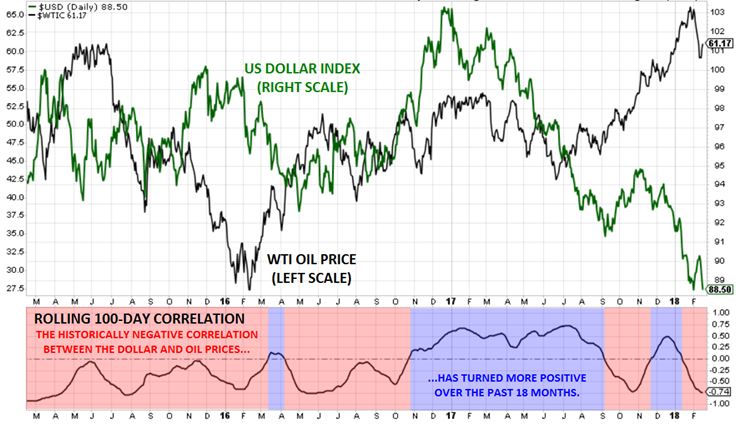Why is this happening?”
It’s often a complicated question, and when it comes to markets, the “why” often takes a backseat to “what” is happening and “how” should it be traded. Nonetheless, it can be worthwhile to understand why a market relationship occurs so that you can adjust more quickly than the competition when the relationship inevitably changes.
One of the first things that many commodity traders learn is that the price of raw materials like oil is inversely related to the value of the US dollar. The explanation for this relationship hinges on two widely-accepted premises. Firstly, a barrel of oil is priced in US dollars across the world, so by definition, strength in the US dollar means it takes fewer greenbacks to buy a barrel of oil (all else equal), and weakness in the US dollar makes the price of oil appear larger in dollar terms. Secondly, because the US has historically been a net importer of oil products, rising oil prices mean that the US current account deficit would rise as citizens and companies shipped more currency abroad.
While the first of these explanations remains unassailable, at least for as long as the dollar is the world’s reserve currency, the second is on shakier footing of late. Due primarily to the success of horizontal drilling and fracking techniques, the US “shale revolution” has dramatically increased domestic petroleum production. In fact, the US became a net exporter of refined petroleum products in 2011 and has now become the third-largest producer of crude oil after Saudi Arabia and Russia. According to the EIA, the US is now about 90% self-sufficient in terms of total energy consumption.
Simply put, a technological breakthrough has upended the status quo in the oil market, much as similar advances have turned retail, lodging, transportation and many other markets on their heads. Economically, this means that higher oil prices no longer lead to a higher deficit, and in fact, can decrease the deficit in certain situations.
As a result, we’ve seen the historically strong inverse relationship between oil prices and the US dollar become more unstable in recent years. Just looking over the previous three years, the rolling 100-day correlation coefficient was consistently negative throughout 2015 and most of 2016 before rising into positive territory for most of last year. Over the last six months, the relationship has been more volatile, oscillating between positive and negative territory.

Source: Faraday Research, Stockcharts.com
Considering the new dynamics of the global energy market, it wouldn’t be surprising to see this historically negative correlation spend more and more time in positive territory. In essence, the US has become the world’s marginal producer of oil products, and the US dollar may therefore start to trade more like a “petrodollar” in the years to come.
Of course, a global growth scare would likely push the relationship back into negative territory. In other words, concerns about slowing growth would prompt traders to sell economically-sensitive oil and buy the greenback, which remains the ultimate “safe haven” currency.
In any event, understanding why the dollar has historically traded inversely to the price of oil and why that correlation has weakened recently can help traders make more informed trading decisions as the global economy continues to evolve.
